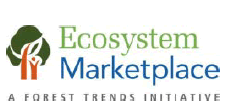Media Contact
Allie Goldstein
+1 202-446-1988
[email protected]
Genevieve Bennett
+1 202-446-1982
[email protected]
Gloria Gonzalez
+1 202-446-1976
[email protected]

21 November 2014 | Washington, D.C. | Demand for carbon offsets earned from forest protection or
renewal grew 17% in 2013 as companies and governments invested $192 million in efforts to plant
trees, improve forest management, support “climate-smart” agriculture, or avoid deforestation.
This value finances forestry that naturally reduces or avoids 32.7 million tonnes of greenhouse gas
emissions, according to the State of the Forest Carbon Markets 2014 report released this week by
Forest Trends’ Ecosystem Marketplace. Last year’s market size tied with record activity tracked in 2010 as
protecting the world’s forests becomes increasingly urgent in the fight against climate change.
“The forest carbon offset market’s growth speaks to the critical role that forest-based climate
solutions are beginning to play in both corporate and government-led risk mitigation,” says
Ecosystem Marketplace Director Molly Peters-Stanley. “Whether the risks are reputational,
infrastructural, or regulation- or market-based, we see these nature-based interventions moving to
the forefront of available solutions due to their multifaceted benefits to people, places, and
pocketbooks.”
Buyer interest in offsets generated by protecting forests – thus avoiding deforestation emissions –
tripled to total 24.7 million tonnes last year, with avoided deforestation projects now covering almost 20 million
hectares, about the forest area of Malaysia. Seventy percent of these reductions originated from
Latin American forestry projects, where Brazil and Peru were the chief sources of offsets from critical forest-rich regions. This
includes a $40 million agreement between the state of Acre, Brazil and German development bank KfW as part of
Germany’s REDD+ Early Movers Programme that pays regional governments for their forest carbon performance.
This kind of government-to-government deal is likely to become more common in the future.
“With dozens of large-scale avoided deforestation programs emerging around the world, the agreement
between Acre and Germany demonstrates that payments can flow not only for preparatory activities
but also as payments for verified emissions reductions,” says Forest Trends President and CEO
Michael Jenkins. “This kind of significant country-level financial contribution provides proof of
concept that will ultimately enable conservation efforts in other jurisdictions.”
Voluntary offset buyers purchased the majority (89%) of forest carbon offsets, led by energy and
food and beverage companies seeking to meet corporate social responsibility commitments or to
demonstrate industry leadership on climate change. Buyers in California and Australia also sought
forestry offsets to comply with domestic climate regulations.
Though cumulative market value topped $1 billion in 2013, project developers are concerned about
future demand. In the context of difficult market dynamics, global average prices declined to
$5.2/tonne, down from $7.8/tonne in 2012, and far short of the $17/tonne that forest project developers say they need to
support existing interventions.
Beyond their climate benefits, the 159 land-use projects Ecosystem Marketplace tracked around the
world also provided considerable value to people and ecosystems. Forest carbon projects created
9,000 jobs, involved 150,000 people in training or capacity-building, and provided $41 million in livelihood benefits
last year as buyers sought out offsets that propelled sustainable development.
Overall, suppliers reported their plans to develop 265 million forest carbon offsets over the next
five years, with Overall, suppliers reported their plans to develop 265 million forest carbon offsets over the next
five years, with more than 200 million tonnes of this planned volume coming from avoided deforestation projects.
However, these potential emissions reductions will only be achieved if companies and governments step up to
finance them, either through deeper corporate commitments to climate leadership or through the
proliferation of carbon pricing regulations that include a land-based offset mechanism.
The State of the Forest Carbon Markets 2014 is publicly and freely available thanks to support from
the report’s sponsors: Baker & McKenzie, EcoPlanet Bamboo, JP Morgan & Chase, and New Forests. For
a copy of the report, please visit: https://www.forest-trends.org/ecosystem_marketplace/2014-year-forest-carbon/

